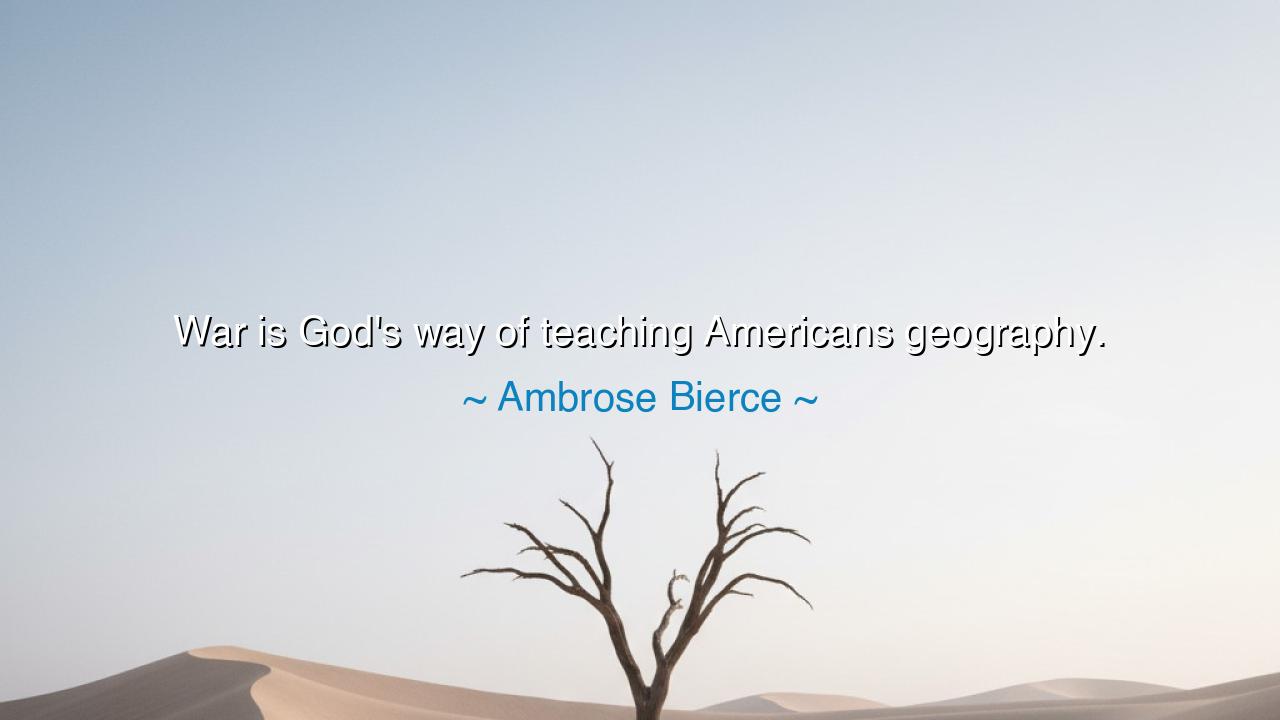
War is God's way of teaching Americans geography.






“War is God’s way of teaching Americans geography.” — so wrote Ambrose Bierce, the dark satirist and veteran soldier whose wit cut as sharply as any blade. In this single line, both humor and sorrow entwine. It is a jest that masks a wound, a truth disguised as laughter. Bierce, who fought in the American Civil War, had looked into the eyes of battle and seen not glory, but absurdity — not divine justice, but human folly. His words echo like the grim chuckle of a weary prophet, reminding future generations that war, though it paints itself in patriotism, too often reveals ignorance rather than wisdom.
To understand his meaning, we must remember the age in which he lived. Ambrose Bierce, known as “Bitter Bierce,” was no stranger to war’s horror. He had marched through blood and chaos as a Union soldier and later became one of America’s fiercest voices against hypocrisy and illusion. When he said that war teaches Americans geography, he spoke not of maps and borders alone, but of the tragic truth that people often learn of the world only through conflict — that nations awaken to the existence of distant lands only when their sons are sent there to fight or die. In his jest, there lies the sorrow of humanity’s shallow curiosity: that we come to know the world not through friendship, but through violence.
Bierce’s irony also exposes the naïveté of patriotism. In his time, many Americans saw their country as isolated, self-contained, and untroubled by the world beyond. But when war calls, suddenly the unfamiliar becomes real — strange names of far-off places enter the daily tongue: Korea, Vietnam, Iraq, Afghanistan. Each generation learns new “geography” through blood and loss. Thus, Bierce’s line is a rebuke to complacency, a mocking sermon against the human tendency to remain ignorant until forced awake by disaster. War, in his vision, is not God’s lesson — it is man’s failure to learn otherwise.
Yet there is in this irony a wider reflection on the nature of knowledge and suffering. Humanity often learns through pain what it could have learned through peace. When empires fall, when cities burn, when borders shift, people suddenly study the map with urgency — understanding too late what they ignored in tranquility. The lesson is ancient: those who refuse wisdom in peace will receive it in war. Bierce, through his sardonic tongue, teaches the same truth that sages and prophets have long declared — that ignorance is always costly, and that arrogance invites catastrophe.
Consider the tale of World War I, when Europe plunged itself into carnage over alliances and pride. Millions who could not have pointed to Serbia or Sarajevo on a map soon knew them all too well. American soldiers, crossing the Atlantic for the first time, learned the geography of France not in classrooms but in trenches. The fields of Verdun, the river Marne, the forest of Argonne — these became lessons written not in ink, but in blood. And so, Bierce’s bitter humor lived on: war became the grim teacher of the ignorant, the cartographer of human folly.
This quote, though humorous in form, carries moral gravity. It is not a jest against Americans alone, but against all peoples who allow ignorance to harden into arrogance. Bierce saw how nations glorify themselves while knowing little of the wider world, and how such blindness breeds conflict. When men see only themselves, every difference becomes a threat. War, then, becomes the cruel geography of the soul — a way for the blind to learn what they refused to see.
The lesson, my child, is clear: seek to know before the world forces you to learn. Do not wait for war to reveal the map. Study the lands and peoples beyond your own; learn their histories, their hopes, their songs. For ignorance is the seed of conflict, and understanding is its antidote. The more you know of others, the harder it is to dehumanize them. Knowledge is peace’s truest armor; empathy its sword.
So, let Bierce’s irony be your wisdom. Laugh, but understand. When he says “war is God’s way of teaching Americans geography,” he means that divine lessons come only when human arrogance leaves no other choice. Do not wait for such harsh instruction. Be curious, be humble, and learn the world in peace — not in blood. For those who know their neighbors need not make war upon them. And if humanity can learn its geography through compassion rather than through conflict, then at last, perhaps, God will no longer need to teach.






AAdministratorAdministrator
Welcome, honored guests. Please leave a comment, we will respond soon